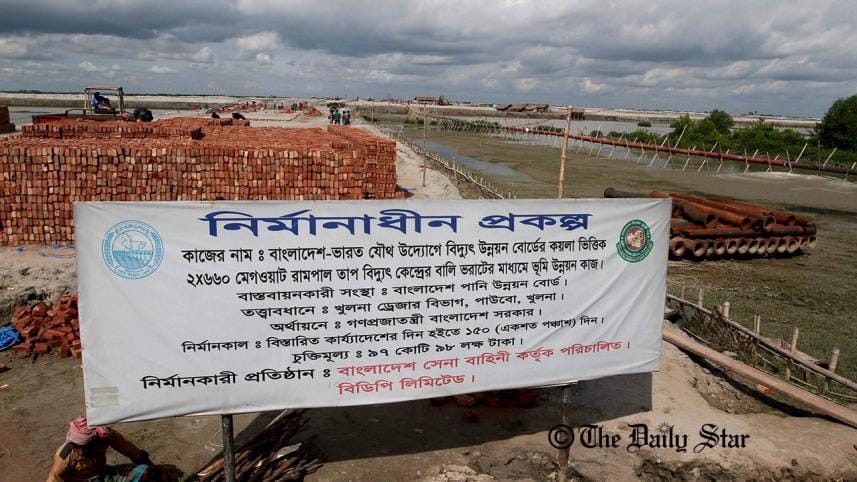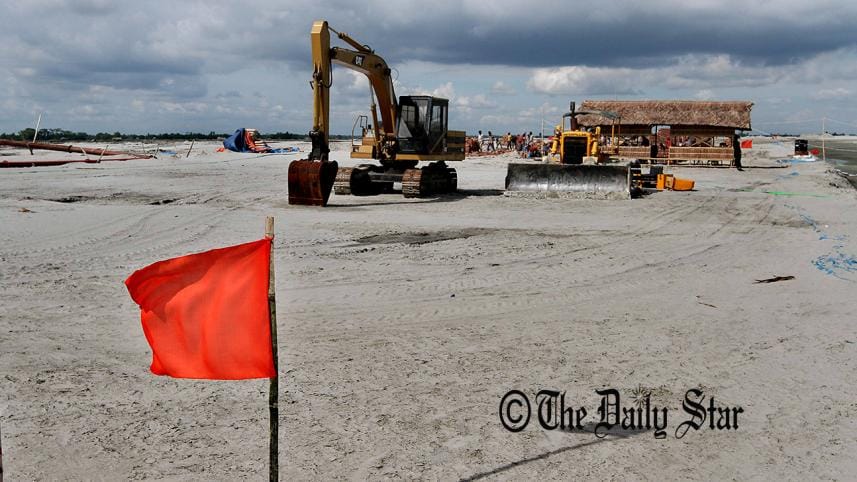French banks ‘won’t invest in Rampal plant’

Three French banks have reportedly said they will not invest in Bangladesh's Rampal power plant.
Six months earlier, two Norwegian pension funds pulled out their investments from India's National Thermal Power Corporation that is building the project, reports The Guardian.
During his visit to Bangladesh on June 6, Indian Prime Minister Narendra Modi endorsed the 1,320MW Rampal coal-based thermal power project.
He said, "The 1320MW Rampal power project is making progress in accordance with your laws and regulation. We can do more together in power sector, here and in India."
Under an agreement signed in 2012, India's largest coal power company, the state-owned National Thermal Power Corporation (NTPC) would develop the plant in Khulna division as a joint venture with Bangladesh's Power Development Board.
Activists are concerned the plant, less than 10 miles from the protected Sundarbans mangrove forest, would lead to its environmental degradation from increased ship traffic, dredging, and pollution of air and water.
Before Modi arrived in Dhaka, activists urged the leaders of the two countries to stop the plant. On 21 May, the National Committee to Protect Oil, Gas, Mineral Resources, Power and Ports held a rally in front of the National Press Club. If the project wasn't stopped, the secretary of the organisation said it would escalate the movement.
On 5 June, other organisations such as National Committee for Saving the Sundarban, Bangladesh Poribesh Andolan, Bangladesh Environmental Lawyers Association, and Poribesh Bachao Andolan renewed their call to scrap the plant.

Their fears are not unfounded. India's first environmental rating of coal-fired thermal plants was published by the Green Rating Project of the Centre for Science and Environment, Delhi.
Since NTPC refused to collaborate, the rating was based on primary data and publicly available information. In India, the company operates 25 thermal plants and a further nine under joint venture collaborations. Six of these plants scored poorly on environmental parameters, rating a mere 16 to 28 percent compared to the best possible rating of 80 percent.
Last month, three French banks declared they will not invest in the project. Stanislas Pottier, Global Head Sustainable Development of Crédit Agricole, said, "Crédit Agricole SA Group has no plans to finance the Rampal coal power plant, in Bangladesh, given our intervention rules and the risks associated with this project."
While Jean-Michel Mépuis, Sustainable Development and Social and Environmental Responsibility Director of Société Génerale, said, "Societe Generale does not provide any financial advisory services and is not currently contemplating any financing related to the Khulna coal-fired power project, located in Rampal, Bangladesh."
BNP Paribas, one of the corporate sponsors of the UN climate summit to be held in Paris in December 2015, also declined to invest in the plant.
Bank Track, a coalition of organisations tracking the financial sector, released its analysis of the Rampal plant under the Equator Principles, an environmental and social risk management framework for financial institutions. In its executive summary, the reports says,
"The analysis shows that serious deficiencies in project design, planning, and implementation and due diligence obligations render the project non-compliant with the minimum social and environmental standards established by the Equator Principles, as well as the International Finance Corporation's Performance Standards."
This failure to achieve even minimum standards could make any financial institution nervous of funding the project.
Loans are expected to fund up to 70 percent of the $1.5b project, while India and Bangladesh will fund the remaining 30 percent equally. However, the Bangladesh Planning Commission refused approval.
It said the project was not compliant with the country's existing policy nor was the funding and ownership of the plant clear. This leaves even the 15 percent Bangladesh stake in the project uncertain.
Even before funds can be raised to build the first plant, the Bangladesh power Development Board has inexplicably started acquiring land for a second plant.



 For all latest news, follow The Daily Star's Google News channel.
For all latest news, follow The Daily Star's Google News channel.
Comments